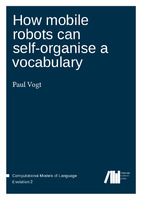How mobile robots can self-organise a vocabulary
Author(s)
Vogt, Paul
Collection
Knowledge Unlatched (KU)Language
EnglishAbstract
One of the hardest problems in science is the symbol grounding problem, a question that has intrigued philosophers and linguists for more than a century. With the rise of artificial intelligence, the question has become very actual, especially within the field of robotics. The problem is that an agent, be it a robot or a human, perceives the world in analogue signals. Yet humans have the ability to categorise the world in symbols that they, for instance, may use for language. This book presents a series of experiments in which two robots try to solve the symbol grounding problem. The experiments are based on the language game paradigm, and involve real mobile robots that are able to develop a grounded lexicon about the objects that they can detect in their world. Crucially, neither the lexicon nor the ontology of the robots has been preprogrammed, so the experiments demonstrate how a population of embodied language users can develop their own vocabularies from scratch.
Keywords
language in robots; artificial intelligence; Feature extraction; Feature vector; Joint attention; Lexicon; Reference; Symbol grounding problem; Talking HeadsDOI
10.26530/OAPEN_603358ISBN
9783946234012OCN
945783174Publisher
Language Science PressPublisher website
https://langsci-press.org/Publication date and place
2015Grantor
Series
Computational Models of Language Evolution, 2Classification
Linguistics
Computing and Information Technology


 Download
Download Web Shop
Web Shop